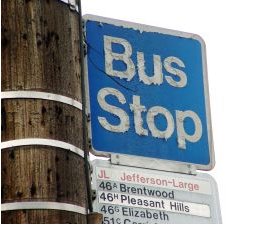The Wheels on the Bus Get Greased
by Brandon Fuller Most people think public transportation is a great idea…for everyone else. For many car owners, the additional inconvenience of public transit is enough to keep them pumping gas and circling the block for a parking spot. But what if bus drivers were determined to pick you up on time, zip you off to your destination as quickly as possible, and compliment you on your sweater?
Most people think public transportation is a great idea…for everyone else. For many car owners, the additional inconvenience of public transit is enough to keep them pumping gas and circling the block for a parking spot. But what if bus drivers were determined to pick you up on time, zip you off to your destination as quickly as possible, and compliment you on your sweater?The thought is not so far fetched in Chile, where an inventive approach to bus driver pay reduces the slog of public transportation. The evidence from Chile's bus system reinforces the first principle of economics: People respond to incentives. In the case of Chilean bus drivers, people sometimes respond a bit too strongly. Read Austan Goolsbee's latest Slate.com column to find out more.
1. How do most bus companies in Santiago, Chile pay their bus drivers? How does bus driver compensation affect delays? What about the number of people on buses?
2. What's a sapos? Would a bus driver paid by the hour place any value on the services of sapos?
3. What are some pitfalls of Santiago's bus system? What's the relationship between incentive pay for bus drivers and the number of accidents involving buses?
4. As Goolsbee points out, the problem with taking the bus is traffic congestion. Bad traffic gives people an incentive to take the bus, but slow buses give people an incentive to stick it out in the privacy of their own car--a vicious cycle. Goolsbee's column addresses one solution. Can you think of others? What about a gasoline tax?
Aplia's Econblog recently wrote about Gary Becker's musings on road fees as traffic decongestants. How might city road fees for individual cars improve the efficiency of the bus system?
Topics: Incentives, Unintended consequences, Traffic congestion



0 Comments:
Post a Comment
<< Home